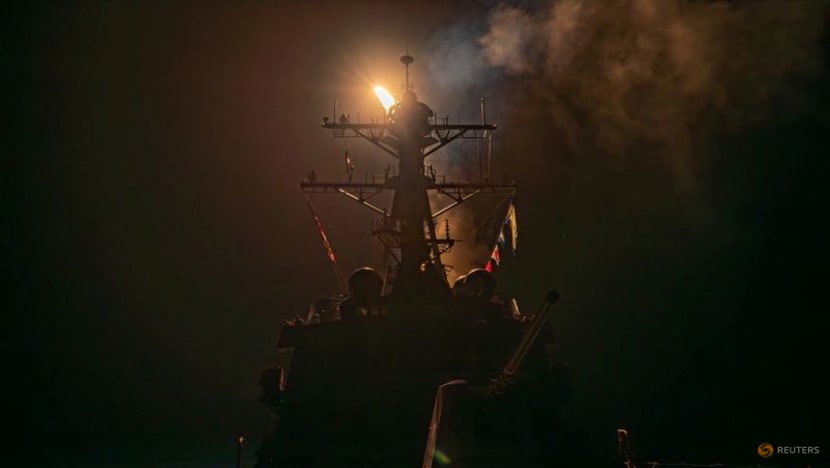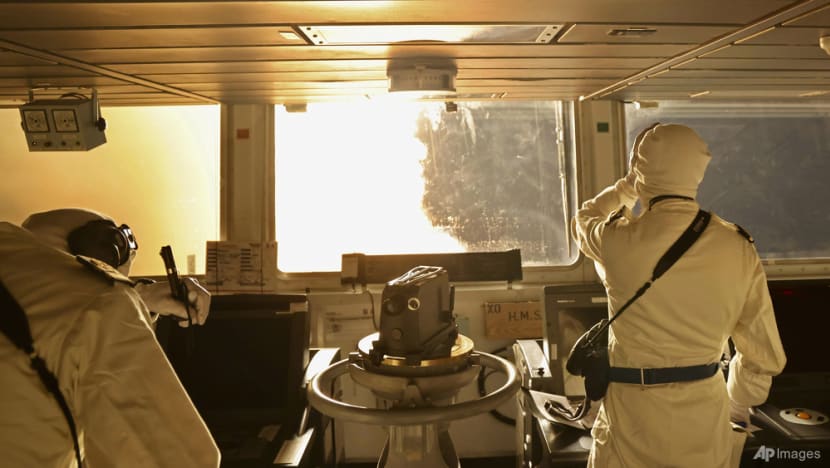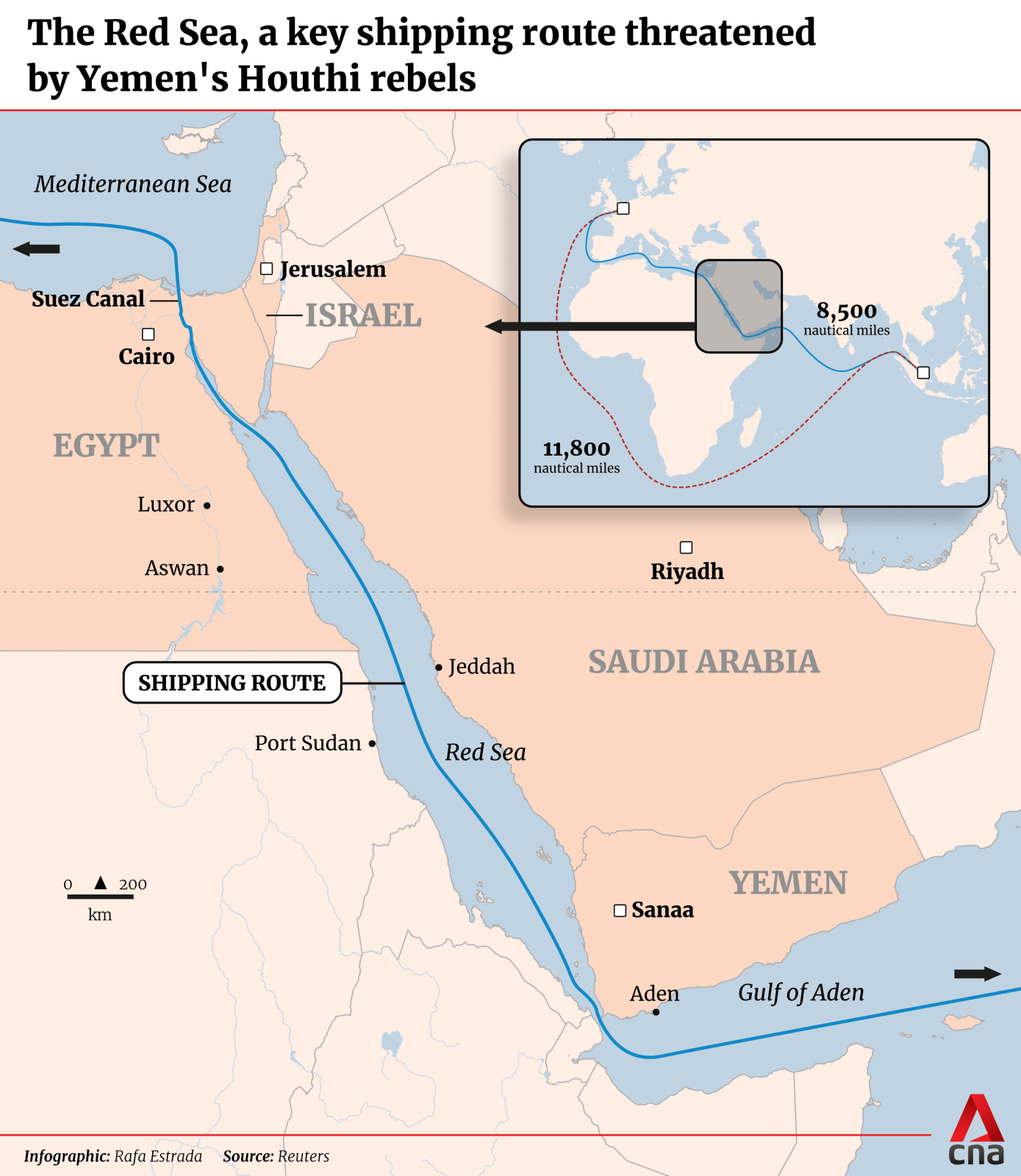Will US and UK strikes on Houthis in Yemen spread the Gaza conflict in the region?
The two countries launched the strikes on Thursday (Jan 11), the first against the Iran-backed group since it started targeting international shipping in the Red Sea late last year.


This audio is generated by an AI tool.
Strikes by the United States and Britain on targets linked to the Houthi movement in Yemen are expected to cause an escalation of the Gaza conflict in the region, with more regional players being drawn in, according to experts.
Tit-for-tat strikes are expected to continue between the Houthis and its backers, and the western coalition, as neither have a clear endgame at the moment, observers said.
The two countries launched the strikes from air and sea on Thursday (Jan 11), the first against the Iran-backed group since it started targeting international shipping in the Red Sea late last year.
The strikes, conducted with support from Australia, Bahrain, Canada, and the Netherlands, were in direct response to the Houthi attacks, said US President Joe Biden.
The Houthis have said their attacks in the Red Sea are a demonstration of support for Hamas, the Palestinian militant group that controls Gaza.
Mr Biden added that he would "not hesitate" to direct further measures to protect people and the free flow of commerce.
A NOTABLE ESCALATION
Mr Ryan Bohl, senior Middle East and North Africa analyst at global risk consultancy RANE, said it is a “notable escalation” from the standpoint of the US-led coalition.
“Up until this point, they have been trying to be responsive to harassment from the Houthis movement in Yemen. They've been trying to block attacks, intercept drones, intercept missiles or boats before they could reach civilian targets,” he told CNA’s Asia First.
“Now they have struck in the territory of Yemen itself, including reportedly in the capital city (of Sanaa).”
The strikes, carried out on infrastructure such as drone sites and missile launch sites, were communicated beforehand, giving the Houthis a chance to evacuate civilians, said Mr Bohl.
“In that sense, they weren't designed to give a knockout blow to the Houthis’ capabilities for maritime harassment,” he noted.
“They were designed to send a stronger political and diplomatic signal to the Houthis that if they continue civilian harassment of these ships going through the Red Sea, then the coalition is willing to respond militarily, including in the territory of Yemen itself and even in the capital city.”
La Trobe University’s emeritus professor of politics Joseph Camilleri told CNA’s Asia Now on Friday that the strikes are “a rather unfortunate development”.
“It's because the United States has got itself into a terrible pickle over the whole Gaza tragedy. It has locked itself into very strong support for the state of Israel at the very time that South Africa has taken Israel to the International Court of Justice,” he said.
Due to the increasing opposition to the actions of Israel, America’s position has been weakened and it is looking for ways to get out of this difficult situation without escalating it, said Prof Camilleri.
While its actions are indeed a reaction to Houthi actions in the Red Sea, however, “responding by unilateral action without reference to the United Nations is not a very good example to follow”, he said.
REGIONAL SPREAD
Retaliatory strikes from the Houthis and its backers should be expected moving forward, according to the experts.
“It's hard to tell exactly when and where that will take place, but certainly the Houthis will respond with some sort of attacks on coalition warships,” said Mr Bohl.
Such attacks will likely be carefully calculated so that they do not actually result in casualties, hence escalating the situation and drawing a stronger response from the western coalition – something the Houthis want to avoid, said Mr Bohl.

Other Iranian-linked militias in countries like Syria, Iraq and Lebanon may also carry out “harassing or symbolic” strikes in retaliation against US and UK forces in the region, he added.
“What's been done so far has been described as a blow to their (the Houthis) capacity. But a blow doesn't mean incapacitating,” Prof Camilleri noted.
“If the facilities are degraded (and) if certain storage of weapons have been destroyed or damaged, then I would expect the backers of the Houthis to come in and try and replenish those facilities or perhaps repair them.”
Tit-for-tat strikes between the Houthis and the western coalition are expected to become a norm, he said.
“Instead of having a de-escalation of the Gaza conflict, we are going to see possibly a significant escalation over the next several months,” he added.
Prof Camilleri also noted that President Biden did not consult with Congress before committing forces in an international arena, something an American president is supposed to do. This has drawn criticism from a number of congressmen within his own Democratic Party.
He said there will be further escalation of the crisis unless there is a “very substantial UN intervention, which does not look very likely because of the power of the veto” by the US.
Mr Bohl noted that neither side has a clear endgame at the moment.
The Houthis were initially looking to goad the coalition into the attacks to get a boost in domestic legitimacy in the northern part of Yemen.
It is hence “very notable” that the western coalition still decided to carry out the strikes despite knowing the Houthis’ domestic political gain, said Mr Bohl.
“But from there, how long the Houthis have that political incentive to keep carrying out maritime attacks and provoking coalition responses, and how long the coalition has the political will to maintain its flotilla in that area and carry out a potentially extended campaign, remains to be seen,” he said.
It would depend heavily on the casualties incurred by either side and also the belief that the other side will be the first to further escalate the conflict, he said.
For the Houthis, such an escalation would be if the West goes after their leadership or disrupts their position and the areas they control, said Mr Bohl. For the West, an escalation would be if the Houthis start targeting oil infrastructure, or oil shipping through the Red Sea or in the Persian Gulf region.
BROADER IMPLICATIONS
Prof Camilleri said that with the latest developments, the Red Sea zone has become an area of conflict which commercial operators would want to avoid, due to the increasingly unpredictable situation.
“Unfortunately, the stated objective of preserving the capacity of commercial shipping to operate in those waters may well in itself be seriously endangered,” he said.
The Houthis have attacked 27 ships to date, disrupting international commerce on the key maritime route between Europe and Asia which accounts for about 15 per cent of global shipping traffic.
Mr Bohl said while it is unlikely that the US and UK strikes will convince the Houthis to stop harassing civilian targets, it may push them to change some of their tactics to try to avoid stronger retaliation by the coalition forces.
“We should expect that the Houthis will continue the harassment, and that it is possible that Iran decides to start picking up some of its own naval harassment in places like the Persian Gulf or the Gulf of Oman,” he said.

Other states in the region will also be closely watching the situation.
“Saudi Arabia was trying to avoid this scenario. They are in delicate ceasefire talks with the Houthis. They have been fighting an intervention there for almost a decade now, that they are trying to extricate themselves from,” explained Mr Bohl.
“So an escalation between their primary military ally, the United States, and their rivals, the Houthis, is not something they exactly welcome, and they are trying to distance themselves from it.”
However, the United Arab Emirates is more hawkish on the Houthis, and were hoping to see the coalition carry out the strikes, in hopes that it might push the Houthis out of territories that the Emiratis and their allies have been seeking for a long time, said Mr Bohl.














